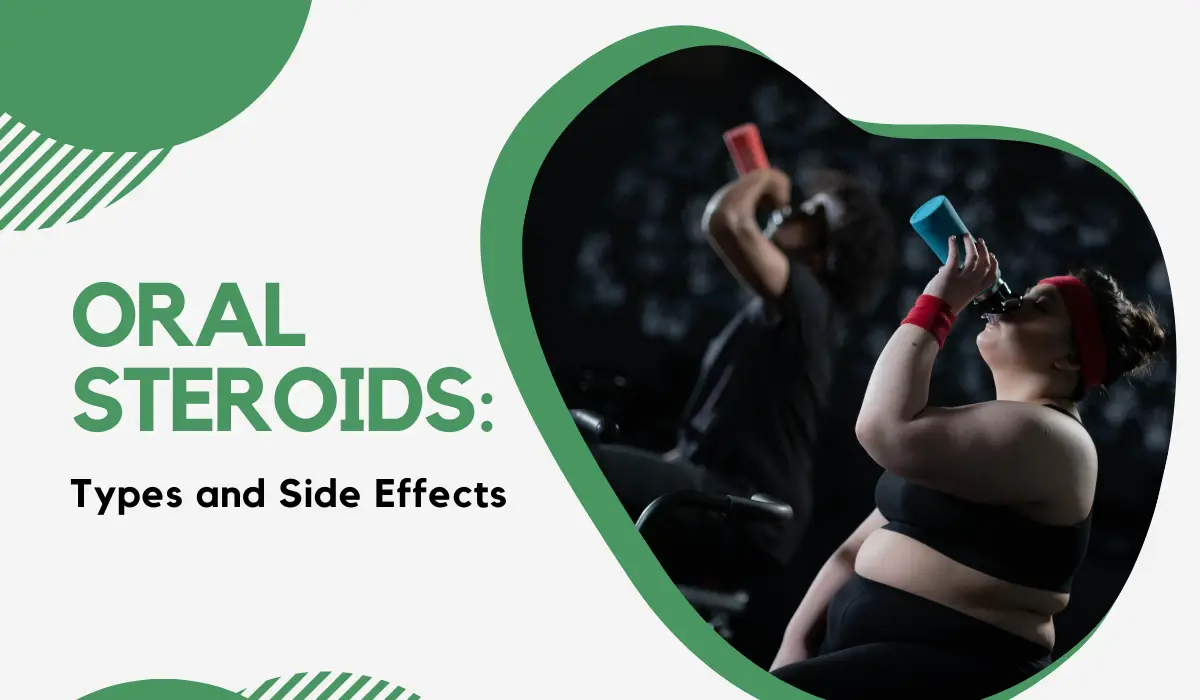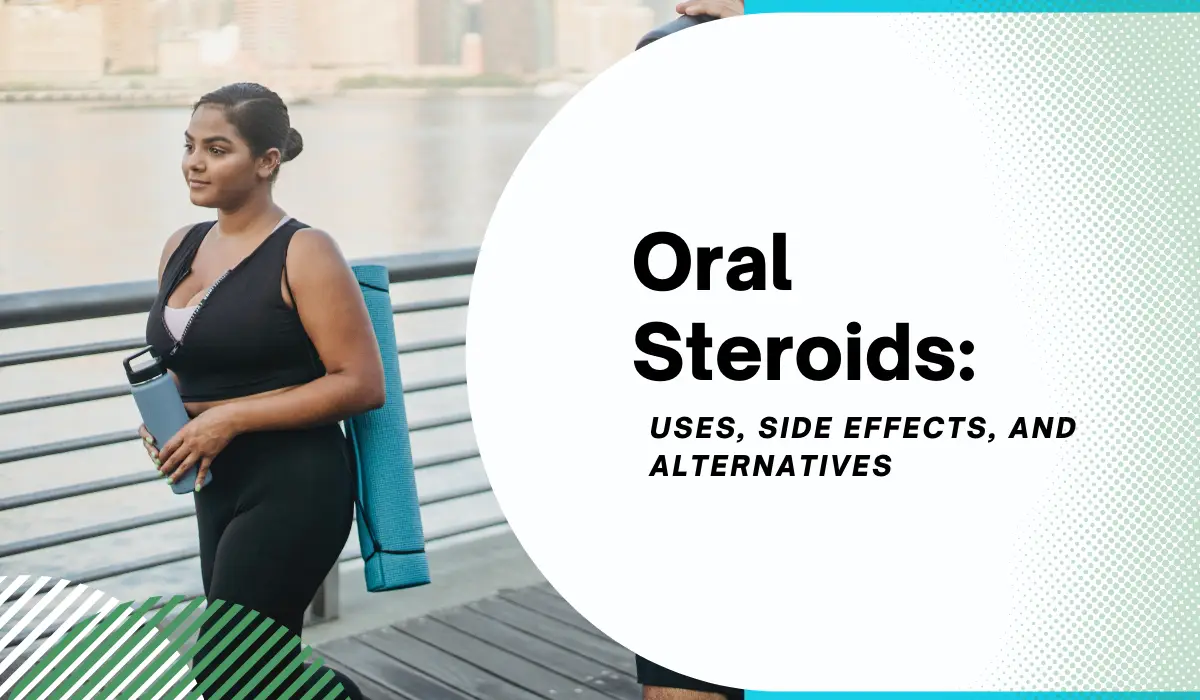Oral steroids are most commonly used to treat muscle-related inflammations, allergies, breathing problems, skin problems, ulcerative colitis, etc. These medications are usually prescribed for these conditions because they have fewer side effects compared to injectable versions of the same drugs. Injectable drugs have a higher risk of side effects because they are directly injected into muscles or the bloodstream.
Defining What Oral Steroid Is
Oral steroids are medications that can be taken by mouth. Some of the most common oral steroid drugs include:
– Methylprednisolone (Medrol) ← Most popular brand name oral steroid in the US market.
– Prednisone (Deltasone, Liquid Pred)
– Triamcinolone (Azmacort, Kenalog)
– Fluorometholone (Flarex) ← Second most popular brand name oral steroid in the US market.
– Betamethasone (Celestone Soluspan)
– Dexamethasone (Decadron)
There are many other oral steroids that are used in the medical field. These medications are usually prescribed to help cure inflammation, suppress the immune system, treat breathing problems, reduce pressure around the brain and eyes, etc. Although these drugs can be taken by mouth for multiple reasons, they can also be injected into muscles or directly into the bloodstream.

How Do Oral Steroids Work?
Oral steroid medications work by reducing inflammation and suppressing the immune system. Reducing inflammation helps relieve pain and swelling that is caused due to muscle or skin inflammations, allergies, ulcerative colitis, etc. Suppressing the immune system helps treat asthma, allergies, asthma, ulcers in the intestine, etc. These drugs are different from most other drugs because they can be injected directly into muscles or the bloodstream for maximum effectiveness.
In addition, Oral steroids are designed to work in the same way as the hormones produced by your adrenal glands in response to stress and injury. When the corticosteroids you take raise your body’s natural adrenal hormones above their normal levels, this reduces inflammation. Corticosteroids also suppress your immune system, which helps people who suffer from autoimmune conditions (such as rheumatoid arthritis) but can also decrease your ability to fight infection.
See info about Carrot Top steroid
When Are They Prescribed?
Doctors prescribe Oral Steroids for a number of reasons, including:
- Addison’s disease. This occurs when your body doesn’t make enough cortisol. Corticosteroids can make up the difference.
- Organ transplants. Corticosteroids help suppress the immune system and reduce the likelihood of organ rejection.
- Inflammation. In cases when inflammation causes damage to important organs, corticosteroids can save lives. Inflammation occurs when the body’s white blood cells are mobilized to protect against infection and foreign substances.
- Autoimmune diseases. Sometimes the immune system doesn’t work correctly, and people develop inflammatory conditions that cause damage instead of protection. Corticosteroids decrease inflammation and prevent this damage. They also affect how white blood cells work and reduce the activity of the immune system.
They’re often used to treat these conditions as well:
- asthma
- hay fever
- hives
- chronic obstructive pulmonary disease (COPD)
- lupus
- inflammatory bowel disease
- multiple sclerosis
How Are Oral Steroids Beneficial?
When inflammation threatens to damage critical body organs, steroids can be organ-saving and in many instances, life-saving. For example, steroids may prevent the worsening of kidney inflammation, which could lead to kidney failure in people who have lupus or vasculitis. For these patients, steroid therapy might eliminate the need for kidney dialysis or transplantation.
Low doses of steroids might provide significant relief from pain and stiffness for people with rheumatoid arthritis. Short-term use of higher doses of steroids might help a person recover from a severe flare-up of arthritis.
Side Effects of Oral Steroids
Although oral steroids are known to provide effective and quick relief from the symptoms of various medical conditions, they do have side effects. Most oral steroids can cause:
– Acne and increase in body hair growth
– Insomnia and mood swings ← Especially in teenagers who are taking these drugs for an extended period of time.
– Swelling around the face, lips, tongue, etc.
– An upset stomach, vomiting or diarrhea
– Changes in blood sugar levels ← These drugs might make you feel hungry all the time, but eating can increase your blood sugar levels. This makes it easy to gain weight quickly.
– Mood swings and increased irritability ← Especially in teenagers who are taking these drugs for an extended period of time.
– High blood pressure ← These drugs have high amounts of salt, so it is possible to develop high blood pressure when you are taking them for an extended period of time.
– Spinning sensation or loss of balance ← If you take oral steroids for a long period of time, these side effects might become noticeable after some time.
Oral steroids can also cause bone loss in some people. This causes bones to become brittle and fragile which might lead to fractures or breaks during an injury. These medications might also increase cholesterol levels, so it is important for you to have your blood pressure checked regularly while taking these drugs.
How Can the Side Effects of Steroids Be Minimized?
To minimize the side effects of steroids, healthcare providers follow several guidelines:
- Use steroids only when necessary.
- Watch the patient closely to detect early signs of serious side effects.
- If possible, use local steroids for local problems.
- Use the smallest dose needed to control the disease.
- Reduce the dose gradually as long as the disease remains under control.
- Monitor blood pressure and blood sugar often and treat if necessary.
- Monitor bone density and prescribe medications and supplements to help bone health.
There are other ways to prevent certain side effects, and these need to be discussed individually with your healthcare provider.
The Positive Effects of Using Oral Steroids
Although oral steroids have a number of side effects, they can be effective when treating certain medical conditions. Injectable versions of the same drugs are usually prescribed for these conditions because injectables have a higher risk of causing infections at injection sites and other secondary problems related to injections. Oral steroids also help treat pain in muscles and joints that help improve mobility.
In addition, It can also be used by athletes to increase physical performance. Here are the top three reasons why athletes use oral steroids:
– To get back in shape quickly ← These drugs are known for providing quick results because they are effective painkillers. They also give you an extra energy boost that helps improve your performance.
– Because it is easily accessible ← Most oral steroids can be easily purchased from the black market.
– To avoid detection ← Most oral steroids don’t stay in your system for a long time, so it is easier to pass drug tests.
How Do You Take Oral Steroids?
Most oral steroid medications are prescribed as one tablet or capsule that is taken two to three times a day. The type of oral steroid (and dosage) your doctor prescribes will depend on the medical condition you are being treated for. Some types of steroids can be taken with or without food.
Doctors usually prescribe these drugs for short-term use unless otherwise specified by the doctor because most oral steroids have side effects when used for a long time.
In addition, you should take oral steroids exactly as prescribed by your doctor or as directed on the product label.
Do not share this medication with anyone else, even if they have the same symptoms you do. Using this drug in larger doses can increase your risk of serious side effects and it may cause more severe problems such as an increased chance of infection, bone loss, anemia, cataracts, or glaucoma.
If you are taking this medication to treat a chronic condition such as asthma, psoriasis, diabetes, or arthritis, follow your doctor’s instructions carefully on how to take it.
However, if you are using oral steroids for their anti-inflammatory effects only (for example, to treat a current infection), you can take the medication in divided doses every 6 hours.
It is important to read the product label of your oral steroid medication for the proper use and dosage information. Some common side effects of steroid medications include headache, upset stomach, diarrhea, flu-like symptoms such as chills and fever, insomnia, nausea, vomiting, mental changes such as depression, mood swings or excitability, and loss of appetite.
Why Do Athletes Use Oral Steroids?
Oral steroids have been the most commonly used form of anabolic steroids because they are effective and can be purchased legally from pharmacies or illegal markets. In addition, these drugs weren’t popular in sports circles until recently when several high-profile cases led to stricter testing of athletes.
How Are Oral Steroids Different From Injectable Steroids?
The main difference between oral steroids and injectable steroids is that oral steroids can be taken by mouth whereas injectable versions of the same drugs must be injected into muscles or directly into the bloodstream. When you take an oral steroid, it can be absorbed through the digestive system before it is broken down in the liver. Injectable steroids, on the other hand, are designed to dissolve directly into the bloodstream so they can be quickly assimilated into muscle tissue.
These drugs also have a short life span in your body because they get processed by the liver. This increases their risk of causing secondary problems that are related to the liver. Injectable versions of steroids are usually recommended for the treatment of more serious medical conditions because they have a higher risk of secondary problems related to injections.
Who Should Take Oral Steroids?
With a shorter course of therapy, these medications may help ease painful inflammation associated with severe acute back and neck pain (pain that arises and resolves quickly, though it may last up to 3-6 months). Oral steroids may also help with painful flare-ups common with chronic inflammatory diseases, such as rheumatoid arthritis. Common conditions treated with oral steroids include low back pain and herniated discs.

Who Should Not Take Oral Steroids?
There are very few people who cannot take oral corticosteroids. Only people who have serious infections (and are not taking treatment for the infection) should not take oral steroids. This is because steroids suppress your immune system, making you less likely to fight off the infection.
Oral steroids are used with caution in people who:
- Have a liver that is not working well.
- Have a history of mental health problems.
- Have open wounds which are healing. (Steroids can interfere with wound healing.)
- Have a history of stomach ulcers or duodenal ulcers.
- Have ‘thinning’ of the bones (osteoporosis).
- Have cataracts.
- Have certain heart conditions, such as a recent heart attack, heart failure, or high blood pressure (hypertension).
- Have diabetes.
- Have epilepsy.
- Are pregnant. (If you take steroids in the first 12 weeks of pregnancy there is possibly a small extra risk of your baby being born with a cleft lip and/or palate. A long course of steroids can affect your baby’s growth.)
- Are breastfeeding. (Ideally do not breastfeed within four hours of taking steroid medicines. The baby may need monitoring if you are taking high-dose steroids and breastfeeding.)
Warnings and Interactions
For most people, including pregnant or breastfeeding women, steroid inhalers and injections are safe. However, they will still only be used if a doctor thinks the potential benefits outweigh the risks.
As steroid tablets are more likely to cause side effects, there are some circumstances when they shouldn’t be used or should only be used with caution. These circumstances include:
- having an ongoing widespread infection
- having mental health or behavioral problems – such as depression or alcohol dependence
- having certain underlying physical conditions – such as liver problems, heart failure, high blood pressure, or diabetes
- taking another medication that may interact with corticosteroids
It’s important to talk to your doctor about the pros and cons of using this medication. If they’re used for a short period (from a few days to a few weeks), it’s possible to have no side effects.
Oral Steroids can be a life-changing or life-saving medication, but long-term use can cause health risks. Despite negative side effects, some conditions do require long-term use. Here are a few things to consider:
- Older people might be more likely to develop issues with high blood pressure and osteoporosis. Women have a higher chance of developing this bone disease.
- Children may experience stunted growth. Corticosteroids can also cause measles or chickenpox infections that are more serious than those in children not taking them.
- Breastfeeding mothers should use steroids with caution. They may cause issues with growth or other effects for the baby.
Make sure to let your doctor know if you’ve had any negative reactions to medicine before. Also, tell your doctor about any allergies you may have.
The Proper Dosage Instructions for Oral Steroids
The proper dosage instructions for oral steroids will vary between individuals and it will depend on their gender. In general, a daily dosage of one tablet or capsule is usually considered to be the proper amount.
In addition, most steroid medications should only be used for a short period of time unless otherwise specified by your doctor. The type of oral steroid (and dosage) your doctor prescribes will depend on the medical condition you are being treated for. Some types of steroids can be taken with or without food.
Doctors usually prescribe these drugs for short-term use unless otherwise specified by the doctor because most oral steroids have side effects when used for a long time.
What to Discuss With Your Healthcare Provider Before Taking Oral Steroids?
Before you start using an oral steroid medication that has been prescribed for you by your doctor make sure you fully understand its uses. In addition, it is important that your doctor knows if you have any of the following conditions:
an infection, including fungal infections
a mental health problem such as depression or alcohol dependence any other medical condition – especially asthma, high blood pressure, diabetes or arthritis
If you are pregnant or breastfeeding it is important for your doctor to know this information.
Never stop taking a prescribed oral steroid medication without first consulting with your doctor. In addition, never take a double dose to make up for a forgotten one, and it is important that you always follow your doctor’s instructions if they recommend that you miss a dose or wait until the next day to take it.
If you have any questions about the proper dosage instructions for your oral steroid medication, speak with your doctor or pharmacist.
Can I Take Other Medicines When I Am Taking Oral Steroids?
You should not take other oral medications or treat your condition with herbal supplements unless you have discussed this with your doctor.
If you are taking any prescription medication to control your asthma, psoriasis, diabetes, arthritis, high blood pressure, depression, tuberculosis infection, or insomnia it is important that you discuss all other prescription and non-prescription drugs you are taking or plan to take with your doctor before starting the medication.
In addition, if you have been prescribed an anti-inflammatory steroid as a treatment for a current infection as well as an oral antibiotic it is important that both medications be taken as directed by your doctor. In some cases, these medications may interact and cause severe side effects.
Summary and Conclusion
In conclusion, Oral Steroids are commonly used to treat many medical conditions. However, there are some precautions that should be taken before you begin treatment. These Oral Steroids can affect other medications you take and may cause dangerous side effects in certain individuals.


